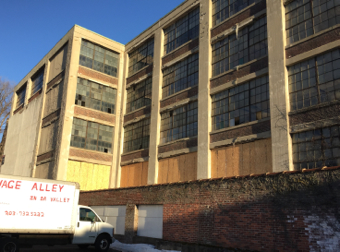The City of Ansonia will file an $8,000 per day lien on a blighted Main Street property after a hearing officer on Thursday denied an appeal from the developer who bought it more than two years ago.
The developer, Moustapha Diakhate, said after the hearing that the lien puts the prospects for the property’s redevelopment in serious doubt. Investors would be hesitant to put money toward a project if there’s a blight lien on the property, 501 E. Main St.
“If they file the lien, I’ll have to walk away,” Diakhate said. “That’s not what I want to do.”
Diakhate can appeal the ruling to the city’s Aldermen or try taking the city to court.
Background
Diakhate purchased the building and several others formerly owned by the Farrel Corp. in January 2013, amid much fanfare and promises of redevelopment. No redevelopment plans have been submitted.
Meanwhile, Mayor David Cassetti’s administration has adopted a get tough policy toward blight -— and Diakhate’s properties downtown are among the most visible blighted properties in the city.
In November the city threatened Diakhate with blight fines of $20,700 per day if he didn’t fix up the process lab, an 88,000-square-foot building with more than 200 broken windows, graffiti, overgrown vegetation, and crumbling cement.
Diakhate promised to fix up the property by Feb. 1.
That deadline came and went with many of the blight issues identified cited by the city still unfixed — like scores of broken windows that weren’t covered.
On Feb. 10, the hearing officer in the case, Keith Murray, gave Diakhate another month to get the problems fixed.
Appeal Denied
The hearing reconvened Thursday, where Murray noted that though some of the broken windows had been covered, at least 90 had not been.
“I gave you 30 days to come back to see if anything would change,” Murray said. “There’s been no change in the windows, so I see absolutely no reason to change my prior ruling.”
Murray said his ruling would cite 80 broken windows. At $100 per window, Diakhate now faces blight fines of $8,000 per day.
Click the play button on the video above to see the hearing.
 Diakhate replied that huge snow mounds had prevented him from getting cranes near the building. He said he had crews cover what windows they could on the building’s lower floors.
Diakhate replied that huge snow mounds had prevented him from getting cranes near the building. He said he had crews cover what windows they could on the building’s lower floors.
City crews moved snow away from the building this week, which will allow more work, he said.
“We couldn’t get close to the windows,” Diakhate told Murray. “Now that the weather’s better and we can actually physically get to the building without causing any safety (concerns) to my guys, we’ll things fixed up.”
Murray said his denial would stand.
“I’ve got a very narrow window of what I can do with what’s in front of me, so my ruling’s going to stay as is,” he said. “I strongly suggest you talk to the town. I strongly suggest you consult with legal counsel. But as it is and given what’s in front of me, I’m not going to change my previous ruling.”
What Now?
Diakhate said after the blight hearing that he hoped to complete the remediation work and convince city officials not to file a lien on the property.
“We’ll keep working at it this week,” he said. “The weather’s changing, thank God, that should be perfect timing.”
Diakhate said the property is unlike a typical blight case because of its size and history of neglect.
“I know how blight stuff works,” he said. “But this is not something you fix with just a hammer and some nails.”
John Marini, the city’s corporation counsel, said the lien will be filed no matter what.
“We need to follow our rules,” Marini said. “The rules afford a lot of flexibility, but at a point in time, push comes to shove, and the penalty phase has to kick in.”
Marini said Diakhate can bring his case to the Board of Aldermen or appeal the ruling to a judge in Superior Court.
The Valley Indy emailed Diakhate Friday asking whether he’ll do so, but did not hear back.